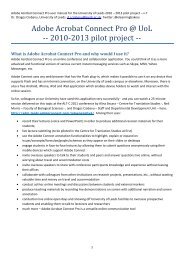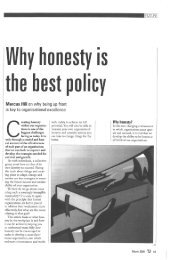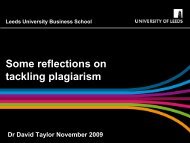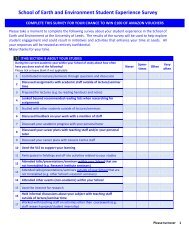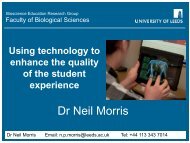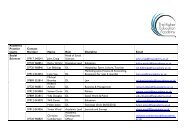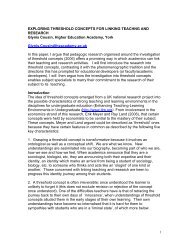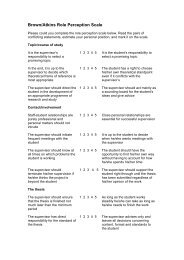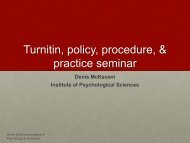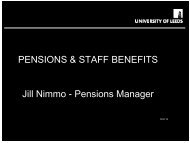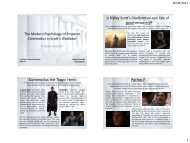ULTA-2 - Staff and Departmental Development Unit - University of ...
ULTA-2 - Staff and Departmental Development Unit - University of ...
ULTA-2 - Staff and Departmental Development Unit - University of ...
Create successful ePaper yourself
Turn your PDF publications into a flip-book with our unique Google optimized e-Paper software.
<strong>Staff</strong> <strong>and</strong> <strong>Departmental</strong><strong>Development</strong> <strong>Unit</strong><strong>ULTA</strong>-2<strong>University</strong> <strong>of</strong> Leeds Teaching Awardpr<strong>of</strong>essional st<strong>and</strong>ard 2Course h<strong>and</strong>book2009 / 10<strong>ULTA</strong>-2 has been accredited by the Higher Education Academy<strong>and</strong> is aligned to the UK Pr<strong>of</strong>essional St<strong>and</strong>ards Framework© SDDU2009
Contents1 Pr<strong>of</strong>essional <strong>Development</strong> in Learning <strong>and</strong> Teaching 12 <strong>ULTA</strong>-2 h<strong>and</strong>book: 2009/10 23 The philosophy <strong>of</strong> the <strong>ULTA</strong>-2 course 34 What will <strong>ULTA</strong>-2 do for you ? 4Aims 4Outcomes 4Values 45 Your commitment to <strong>ULTA</strong>-2 56 Restrictions to the ways in which you can complete <strong>ULTA</strong>-2 57 Attendance 58 Programme 2009/10 6COHORT 1 6COHORT 2 8COHORT 3 109 How will the course be taught ? 1210 How you will be assessed 13Submission <strong>of</strong> assignments 14Assignment surgeries 14Flexibility 14Extensions 1411 The support you will get 15Contacts 1612 Mentors 17The Role <strong>of</strong> the Mentor 17Competencies <strong>of</strong> a Mentor 17The Tasks <strong>of</strong> a Mentor 1813 Quality Management & Enhancement Procedures 19Participant feedback 19External examiner 19Participant- <strong>Staff</strong> Forum 19Learning & Teaching Committee (SDDULTC) 2014 Reading lists 21Annex: The National Framework for Pr<strong>of</strong>essional St<strong>and</strong>ards in Teaching <strong>and</strong> Supporting Learning 22
<strong>ULTA</strong>-2 Course H<strong>and</strong>book 2009/101 Pr<strong>of</strong>essional <strong>Development</strong> in Learning <strong>and</strong> TeachingIn response to the National Framework for Pr<strong>of</strong>essional St<strong>and</strong>ards in Teaching <strong>and</strong> Supporting Learning 1 (seeAnnex) the <strong>Staff</strong> <strong>and</strong> <strong>Departmental</strong> <strong>Development</strong> <strong>Unit</strong> (SDDU) as designed a multi-stage programme <strong>of</strong>progressive <strong>and</strong> continuing pr<strong>of</strong>essional development in learning <strong>and</strong> teaching <strong>and</strong> other aspects <strong>of</strong> academicpractice (which have credit value or result in a qualification) which is available to staff at the <strong>University</strong> <strong>of</strong>Leeds.<strong>University</strong> <strong>of</strong> Leeds Teaching Award (pr<strong>of</strong>essional st<strong>and</strong>ard 1)<strong>ULTA</strong>-1 (20 M-level credits)Provides an introduction to teaching methods for postgraduates, research staff, clinical staff <strong>and</strong> other parttimeteachers whose teaching role is limited.<strong>University</strong> <strong>of</strong> Leeds Teaching Award (pr<strong>of</strong>essional st<strong>and</strong>ard 2)<strong>ULTA</strong>-2 (40 M-level credits)Provides a systematic induction into the processes <strong>of</strong> teaching <strong>and</strong> managing student learning <strong>and</strong> is designedfor staff on the Teaching & Research <strong>and</strong> Teaching & Scholarship Career Pathways 2 with a full range <strong>of</strong>teaching responsibilities. It is compulsory for all staff newly appointed to Leeds with a contract <strong>of</strong> 0.5 fte <strong>and</strong>above who have a teaching role <strong>and</strong> are deemed new to teaching in HE 3 .Postgraduate Certificate inLearning & Teaching(taught)Postgraduate Certificate inAcademic Practice (taught)PGCLTHE / PGCAP(60 M-level credits)Are qualifications that can begained by building on thefoundation <strong>of</strong> <strong>ULTA</strong>-2.Postgraduate Certificate inLearning & Teaching(portfolio)PGCLTHE (portfolio)(60 M-level credits)Designed for staff withappropriate experience <strong>of</strong>teaching in higher educationwho do not have formalteaching-relatedqualifications or credits butwish to gain a <strong>University</strong>qualification that recognisestheir quality <strong>and</strong> competenceas teachers in highereducation.Postgraduate Certificate inLearning & Teaching (APL)PGCLTHE (APL)(60 M-level credits)Designed for staff withappropriate experience <strong>of</strong>teaching in higher educationwho wish to gain a <strong>University</strong>qualification that recognisestheir quality <strong>and</strong> competencyas teachers in highereducation but who also wantto claim advanced st<strong>and</strong>ingfor existing, appropriatequalifications/credits.Postgraduate Diploma in Learning & TeachingPGDLTHE (120 M-level credits)Designed for more experienced staff who wish to develop <strong>and</strong> research their practice.Master <strong>of</strong> EducationMA (180 M-level credits)In addition, a range <strong>of</strong> non-credit bearing courses are available 4 . It is planned to gain accreditation at allthree st<strong>and</strong>ards <strong>of</strong> the national framework by <strong>of</strong>fering a range <strong>of</strong> combinations <strong>of</strong> the credit <strong>and</strong> non-creditbearing courses.1http://www.heacademy.ac.uk/ourwork/policy/framework2www.leeds.ac.uk/hr/roleanalysis/rolepr<strong>of</strong>iles.doc3http://www.leeds.ac.uk/sddu/lt/ulta/ulta2_hos.html4www.leeds.ac.uk/sddu/lt/lt_home.php<strong>Staff</strong> <strong>and</strong> <strong>Departmental</strong> <strong>Development</strong> <strong>Unit</strong> page 1 <strong>University</strong> <strong>of</strong> Leeds
<strong>ULTA</strong>-2 Course H<strong>and</strong>book 2009/102 <strong>ULTA</strong>-2 h<strong>and</strong>book: 2009/10This h<strong>and</strong>book gives you general information that relates to the two modules that comprise the <strong>University</strong> <strong>of</strong>Leeds Teaching Award - pr<strong>of</strong>essional st<strong>and</strong>ard 2 (<strong>ULTA</strong>-2).<strong>ULTA</strong>-2 is taught <strong>and</strong> assessed by the SDDU. To gain the Award, you have to complete a 40-credit, M-levelcourse in learning <strong>and</strong> teaching in higher education that satisfies st<strong>and</strong>ard 2 <strong>of</strong> the National Framework forPr<strong>of</strong>essional St<strong>and</strong>ards in Teaching <strong>and</strong> Supporting Learning (see Annex) <strong>and</strong> takes account <strong>of</strong> <strong>University</strong> <strong>of</strong>Leeds priorities in learning <strong>and</strong> teaching. The course has been accredited by the Higher Education Academyat Fellow grade.The <strong>University</strong> <strong>of</strong> Leeds Senate decided, in October 2006, that successful completion <strong>of</strong> all requirements <strong>of</strong>the <strong>ULTA</strong>-2, or an appropriate alternative, should be compulsory for all newly appointed staff with a contractequivalent to 0.5 <strong>of</strong> full-time (0.5 fte) <strong>and</strong> above who have a teaching role <strong>and</strong> are deemed new to teaching inHigher Education. This includes:Teaching & Research Pr<strong>of</strong>ile Grades 7 & 8Teaching & Scholarship Pr<strong>of</strong>ile Grades 6 – 8<strong>University</strong> Research FellowsResearch Council <strong>and</strong> Royal Society Research FellowsAcademic Fellows during the second stage <strong>of</strong> probation.In addition, it was agreed thatregistration, or not, for <strong>ULTA</strong>-2 will, normally, be decided by the panel appointing new staff membersall modules should be passed in a maximum <strong>of</strong> two years (pro-rata for part-time staff)a minimum <strong>of</strong> 165 hours will be built into workload models, over two years, for full-time staff who arerequired to complete the award (pro-rata for part-time staff).<strong>Staff</strong> will be deemed new to teaching in HE if they cannot evidence one <strong>of</strong> the followinga Successful completion <strong>of</strong> a similar programme in another HEI that satisfies the UK Pr<strong>of</strong>essionalSt<strong>and</strong>ards Framework for Learning <strong>and</strong> Teaching in Higher Education, st<strong>and</strong>ard 2bcRegistered Practitioner/Fellow status with the HE AcademyThree or more years’ experience in the last five <strong>of</strong> teaching in HE which includes all <strong>of</strong> the following:iiiiiidesign <strong>and</strong> delivery (i.e. teaching) <strong>of</strong> individual classes appropriate to the discipline (e.g.lectures, tutorials, seminars, labs, workshops, e-learning etc.)assessment <strong>of</strong> student work including the setting <strong>of</strong> assessments, marking <strong>and</strong> givingfeedback to studentsdesign <strong>of</strong> a coherent sequence <strong>of</strong> teaching / student learning events (e.g. module, firm orequivalent) delivered by themselves <strong>and</strong>/or othersiv provision <strong>of</strong> academic <strong>and</strong> pastoral support to students at different stages <strong>of</strong> their degree.A teaching reference from a previous institution attesting to the quality <strong>of</strong> teaching & management <strong>of</strong>student learning should form part <strong>of</strong> the evidence for (c) above.<strong>ULTA</strong>-2 builds on the <strong>University</strong> <strong>of</strong> Leeds Teaching Award - pr<strong>of</strong>essional st<strong>and</strong>ard 1 (<strong>ULTA</strong>-1), which satisfiesthe requirements <strong>of</strong> st<strong>and</strong>ard 1 <strong>of</strong> the UK National Framework for Pr<strong>of</strong>essional St<strong>and</strong>ards in Teaching <strong>and</strong>Supporting Learning<strong>ULTA</strong>-1 provides an opportunity for part-time teachers within the <strong>University</strong> to validate their training <strong>and</strong>teaching experience through completing a module appropriate to their role, <strong>and</strong> is suitable for:research staff, teaching assistants <strong>and</strong> postgraduate research students who wish to pursue anacademic career <strong>and</strong>/or to enhance their employabilitystaff who teach part-time or as a secondary part <strong>of</strong> their role <strong>and</strong> who wish to enhance their practice.<strong>Staff</strong> <strong>and</strong> <strong>Departmental</strong> <strong>Development</strong> <strong>Unit</strong> page 2 <strong>University</strong> <strong>of</strong> Leeds
<strong>ULTA</strong>-2 Course H<strong>and</strong>book 2009/103 The philosophy <strong>of</strong> the <strong>ULTA</strong>-2 course<strong>ULTA</strong>-2 has been tailored to the needs <strong>of</strong> new lecturers as identified through discussions with new <strong>and</strong>experienced lecturers, evaluation <strong>of</strong> its predecessor the Postgraduate Certificate in Learning & Teaching inHigher Education (1993/94 – 2006/07), the previous two cycles <strong>of</strong> <strong>ULTA</strong>-2 (2007/09) <strong>and</strong> from analyses <strong>of</strong> the<strong>University</strong>’s own development needs. It focuses upon the responsibilities <strong>of</strong> new lecturers as teachers <strong>and</strong> asassessors <strong>of</strong> student learning. The course responds to the changing dem<strong>and</strong>s <strong>of</strong> the pr<strong>of</strong>ession <strong>and</strong> reflectscurrent issues <strong>and</strong> concerns both at Leeds <strong>and</strong> nationally.Start where participants areMost newly appointed lecturers are likely to have more experience <strong>of</strong> research than <strong>of</strong> teaching. Therefore themodules <strong>of</strong> the course focus sharply upon what are likely to be your immediate concerns: lecturing <strong>and</strong>teaching by other methods; assessing <strong>and</strong> giving feedback on achievement by students; managing studentlearning; <strong>and</strong> designing <strong>and</strong> evaluating teaching. The opportunities provided for discussing, sharing ideas <strong>and</strong>reflecting on application to particular contexts <strong>and</strong> disciplines means that the course has value to all staff withteaching responsibilities.Be learner centredThe course is related to your work <strong>and</strong> experiences <strong>and</strong> to the needs <strong>of</strong> the students whom you are teaching:it focuses upon problems <strong>and</strong> issues that newly appointed lecturers have identified. There are opportunities toshare practice <strong>and</strong> problems. The tasks <strong>and</strong> assignments are rooted firmly in your work so that, in carryingout the tasks <strong>and</strong> assignments, you deepen your personal underst<strong>and</strong>ing <strong>of</strong> the processes <strong>of</strong> teaching,learning <strong>and</strong> assessment in your own subject.Also, since people learn in different ways <strong>and</strong> have different learning preferences, the course incorporates anumber <strong>of</strong> teaching <strong>and</strong> learning methods. Acknowledging individual differences also dem<strong>and</strong>s recognition <strong>of</strong>equal opportunities <strong>and</strong> cultural diversity. Equal opportunities policies <strong>and</strong> best practice should informeverything that a lecturer does. This requires an underst<strong>and</strong>ing <strong>of</strong> equal opportunities in the curriculum <strong>and</strong> inthe institution. The programme will encourage participants to consider issues <strong>of</strong> cultural <strong>and</strong> educationaldiversity as appropriate to their teaching contexts.Be colleague centredYou <strong>and</strong> other participants on the course are not undergraduates but colleagues with your own pr<strong>of</strong>essionalexpertise to develop. It is therefore important that the tutors involved are sensitive to the needs <strong>and</strong> status <strong>of</strong>the group. The programme will demonstrate the value <strong>of</strong> working with, <strong>and</strong> learning from, colleagues.Through its delivery methods, the course will enable participants to benefit from co-operation <strong>and</strong> sharing, <strong>and</strong>encourage a more open <strong>and</strong> collaborative approach to teaching.In addition, every participant will be assigned to a departmental mentor for teaching who will have jointresponsibility with you for your pr<strong>of</strong>essional development on the course. The section on mentoring in thish<strong>and</strong>book will form part <strong>of</strong> the briefing for all mentors.Develop reflective practitionersIt is not proposed to rehearse all the arguments from Kolb (1984) 5 , Schön (1988) 6 , Moon (2004) 7 <strong>and</strong> otherwriters on the value <strong>of</strong> reflective learning. The primary purpose <strong>of</strong> the programme is to lay the foundations <strong>of</strong>continuing pr<strong>of</strong>essional development so that as a lecturer you are equipped to analyse <strong>and</strong> respond tochanges in teaching, learning <strong>and</strong> assessment throughout your career. Hence, the programme will encourageyou to reflect on your approaches to these responsibilities through the tasks, assignments <strong>and</strong> discussionswith your mentor <strong>and</strong> other participants. Through this process it is anticipated that you will both develop yourexpertise <strong>and</strong> deepen your underst<strong>and</strong>ing <strong>of</strong> teaching, learning <strong>and</strong> assessment.As a ‘reflective practitioner’ you will:review your own performance <strong>and</strong> take account <strong>of</strong> peer <strong>and</strong> student feedbackselect teaching methods that allow for student learning styles, preferences <strong>and</strong> previous experiencerefer to the literature on learning <strong>and</strong> teaching as well as taking account <strong>of</strong> your own experienceconstantly seek means to enhance both the learning experiences <strong>of</strong> your students <strong>and</strong> your own experienceas a lecturer.5Kolb, D., 1984. Experiential Learning: experience as a source <strong>of</strong> learning. Englewood Cliffs: Prentice Hall.6Schön, D.A., 1988. Educating the Reflective Practitioner. San Francisco: Jossey Bass.7Moon, J., 2004. Reflection in Learning & Personal <strong>Development</strong>. London: RoutledgeFalmer.<strong>Staff</strong> <strong>and</strong> <strong>Departmental</strong> <strong>Development</strong> <strong>Unit</strong> page 3 <strong>University</strong> <strong>of</strong> Leeds
<strong>ULTA</strong>-2 Course H<strong>and</strong>book 2009/104 What will <strong>ULTA</strong>-2 do for you ?<strong>ULTA</strong>-2 is approved <strong>and</strong> quality assured by the <strong>University</strong>’s Learning <strong>and</strong> Teaching Board (LTB) as a 40-credit, level M award. It comprises two modules:SDDU5415 - Teaching in the <strong>University</strong> - 20 M-level creditsSDDU5425 – Enhancing Your Practice - 20 M-level credits.AimsThe overall purpose <strong>of</strong> <strong>ULTA</strong>-2 is to develop independent, competent pr<strong>of</strong>essionals who have knowledge <strong>and</strong>expertise in the areas <strong>of</strong> higher education teaching <strong>and</strong> its management in the wider context <strong>of</strong> a changingstudent population. The programme focuses initially upon the practical tasks <strong>of</strong> newly appointed staff. Itsaims are, therefore, to:provide participants with an opportunity to critically reflect upon, assess <strong>and</strong> develop their pr<strong>of</strong>essionalexpertise as teachers at the <strong>University</strong> <strong>of</strong> Leeds based upon both good practice <strong>and</strong> research intolearning <strong>and</strong> teachingdevelop the knowledge, skills, competencies <strong>and</strong> underst<strong>and</strong>ing necessary for effective teaching <strong>and</strong>management <strong>of</strong> student learning at university level <strong>and</strong> which take account <strong>of</strong> the needs <strong>and</strong>backgrounds <strong>of</strong> students <strong>and</strong> the provision <strong>of</strong> equal opportunitiesestablish a network <strong>of</strong> support amongst participants that will enable them to carry out their teachingduties with a greater degree <strong>of</strong> confidence, underst<strong>and</strong>ing <strong>and</strong> satisfactionprovide a pathway to registration with the Higher Education Academycontribute to the improvement <strong>of</strong> the status <strong>of</strong> teaching <strong>and</strong> the quality <strong>of</strong> student learning at the<strong>University</strong> <strong>of</strong> Leedsdemonstrate the commitment <strong>of</strong> the <strong>University</strong> to the value <strong>of</strong> pr<strong>of</strong>essional development in teaching.Outcomes<strong>ULTA</strong>-2 will provide you with opportunities to explore a variety <strong>of</strong> approaches to teaching, learning <strong>and</strong>assessment with particular reference to current developments <strong>and</strong> issues in higher education, <strong>and</strong> toexperience a range <strong>of</strong> teaching/learning methods (including online learning <strong>and</strong> various formats <strong>of</strong> face-to-faceteaching). As a result, by the end <strong>of</strong> <strong>ULTA</strong>-2, you will be better able to:demonstrate competence <strong>and</strong> skill in the rationale for <strong>and</strong> use <strong>of</strong> a wide range <strong>of</strong> methods <strong>of</strong> teaching,learning <strong>and</strong> assessmentplan, implement <strong>and</strong> evaluate your own teaching strategies, based upon both good practice <strong>and</strong>research into learning <strong>and</strong> teachingidentify student learning needs <strong>and</strong> take account <strong>of</strong> those needs in your design <strong>of</strong> teaching <strong>and</strong> in theteaching methods <strong>and</strong> learning opportunities provided to studentsdesign coherent teaching/learning courses incorporating congruous assessment procedures <strong>and</strong>appropriate technologiesdevelop methods <strong>of</strong> evaluating teaching <strong>and</strong> coursesreflect critically upon your own teaching practice, identify developmental needs <strong>and</strong> formulate plans forappropriate continuing pr<strong>of</strong>essional developmentenhance your knowledge <strong>and</strong> underst<strong>and</strong>ing <strong>of</strong> higher education through awareness <strong>of</strong> <strong>and</strong> ability toevaluate relevant educational literature (both generic <strong>and</strong> subject-specific).ValuesThe <strong>University</strong> values (Academic excellence, Community, Integrity, Inclusiveness, <strong>and</strong> Pr<strong>of</strong>essionalism -http://tldynamic.leeds.ac.uk/strategy///values/index.htm) are implicit in the outcomes because they describehow we work together as a <strong>University</strong> to deliver the vision <strong>and</strong> strategy. In particular, they translate in thiscourse to:the importance <strong>of</strong> pr<strong>of</strong>essional practices which respect <strong>and</strong> enable the progression <strong>and</strong> empowerment<strong>of</strong> individual learnersthe value <strong>of</strong> scholarship for the development <strong>of</strong> pr<strong>of</strong>essional practice <strong>and</strong> knowledgea commitment to engaging in <strong>and</strong> supporting communities <strong>of</strong> practice amongst students <strong>and</strong>colleagues for mutual support <strong>and</strong> learningthe promotion <strong>and</strong> implementation <strong>of</strong> equal opportunity practices to facilitate full participation by allstudents <strong>and</strong> colleaguesthe need for teachers continually to develop <strong>and</strong> extend their pedagogical knowledge <strong>and</strong>underst<strong>and</strong>ingthe contribution <strong>of</strong> critical reflection to the development <strong>of</strong> practice <strong>and</strong> underst<strong>and</strong>ing.<strong>Staff</strong> <strong>and</strong> <strong>Departmental</strong> <strong>Development</strong> <strong>Unit</strong> page 4 <strong>University</strong> <strong>of</strong> Leeds
<strong>ULTA</strong>-2 Course H<strong>and</strong>book 2009/105 Your commitment to <strong>ULTA</strong>-2The maximum period that you have to finish <strong>ULTA</strong>-2 is two years (pro rata for part-time staff) <strong>and</strong> you shouldhave a time allowance (a minimum <strong>of</strong> 165 hours) included in your workload.The schedules for 2009/10 are given in Section 8. In order that you can build the course into your work toensure that you are teaching during the period when you attend the timetabled sessions <strong>and</strong> to avoid clasheswith other major responsibilities <strong>and</strong> commitments within your School, there are now three start dates for thecourse each academic year: September; December; <strong>and</strong> March. A new cohort <strong>of</strong> (approximately) 25participants will start the course at each <strong>of</strong> these times.SDDU5415 compriseso three full days - block 1o 3 Wednesday afternoons - block 2ooreference to online resourcestime-bound tasks that you are required to complete.SDDU5425 compriseso three full days - block 3o 3 Wednesday afternoons - block 4o reference to online resourcesotime-bound tasks that you are required to complete.in addition, you are expected to attend the <strong>University</strong> <strong>of</strong> Leeds Learning & Teaching Conference <strong>and</strong>the meeting with the Pro-Dean for Leaning <strong>and</strong> Teaching in your facultyalso, there are optional sessions: Delivery Techniques in December; <strong>and</strong> assignment clinics in March,June <strong>and</strong> Novembereach module is assessed by tasks <strong>and</strong> a case study based on your work with studentsyou will need to meet your mentor on several occasions for each assignmentyour mentor will observe you teaching as part <strong>of</strong> the assignment for SDDU5415you are required to attend all <strong>of</strong> the sessions for which you are registered (see section 7)both modules require you to make use <strong>of</strong> the VLE; you must, therefore, have a VLE username.6 Restrictions to the ways in which you can complete <strong>ULTA</strong>-2The maximum period that you have to finish <strong>ULTA</strong>-2 is two years. In addition:iiiiiiivit is expected that you will stay with the cohort you initially register with for all <strong>of</strong> the attendancerequirementsmodule SDDU5415 (Teaching at the <strong>University</strong>) must be completed before SDDU5425 (EnhancingYour Practice)tasks for module SDDU5415 must be completed before starting module SDDU5425feedback must be received on the first case study before the second case study can be submitted.7 AttendanceAttendance at the workshops is regarded as an integral part <strong>of</strong> the learning experience on the course <strong>and</strong> isconsistent with the philosophy <strong>of</strong> the course <strong>of</strong> being colleague-centred <strong>and</strong> the <strong>University</strong> value <strong>of</strong> community.If you are unable to attend any part or all <strong>of</strong> a session in any module, you must advise Catherine Taylor oreither the module or cohort leader at the earliest opportunity. Your attendance at an equivalent session maynot be possible within the same academic year Subject to the discretion <strong>of</strong> the course leader, in consultationwith the External Examiner, non-attendance may have an impact on the date you are able to complete amodule <strong>and</strong> gain the award.If you wish to withdraw from the course you must complete the appropriate form which requires endorsementfrom your Head <strong>of</strong> School <strong>and</strong> is available from Catherine Taylor.It was agreed by the SDDU LTC <strong>and</strong> Participant-<strong>Staff</strong> Forum that if a participant on the course does notrespond to emails concerning their plans for the course, particularly when they are approaching their deadline,further correspondence will be copied to their mentor <strong>and</strong> Head <strong>of</strong> School.<strong>Staff</strong> <strong>and</strong> <strong>Departmental</strong> <strong>Development</strong> <strong>Unit</strong> page 5 <strong>University</strong> <strong>of</strong> Leeds
<strong>ULTA</strong>-2 Course H<strong>and</strong>book 2009/108 Programme 2009/10 COHORT 1SDDU5415: Teaching at the <strong>University</strong>BLOCK 1 - 3 x 1 dayTuesday 15 September 2009 (9.30 am - 4.30 pm)Introduction to teaching at Leeds <strong>and</strong> an overview <strong>of</strong> the Leeds Teaching AwardVideo-recording [A-1] & lecturing <strong>and</strong> explaining [A-2]Following an introduction to teaching at Leeds, <strong>and</strong> an overview <strong>of</strong> <strong>ULTA</strong>-2, you will work in small groups to give shortpresentations (mini-lectures) which will be video-recorded. The recordings will be reviewed with a tutor <strong>and</strong> coursecolleagues. In the afternoon session a number <strong>of</strong> aspects <strong>of</strong> lecture planning, structuring <strong>and</strong> presenting will be discussed.Wednesday 16 September 2009 (9.30 am - 4.30 pm)Small group teaching [A-3]Learning in small groups is an important component <strong>of</strong> the student experience at Leeds. As well as being a means <strong>of</strong>reviewing subject content, small-group work is a useful means for helping students to develop collaborative,communication <strong>and</strong> interpersonal skills. The session will focus on student behaviours in group contexts, <strong>and</strong> how we canrespond to ‘difficult’ situations. We will also look at a range <strong>of</strong> factors relating to group size <strong>and</strong> composition, <strong>and</strong> how bestto ensure that students participate fully in group work contexts.Assessing students: marking & giving feedback [A-4]The session will look at the reasons for assessing students <strong>and</strong> what different assessments methods can measure. It willalso take a practical look at how to approach the task <strong>of</strong> marking student work <strong>and</strong> giving feedback to students.Friday 18 September 2009 (9.30 am - 4.30 pm)Introduction to Blended Learning - a student perspective, <strong>and</strong> Academic Identities [A-5]This session will introduce blended learning, its importance in Higher Education <strong>and</strong> the <strong>University</strong>'s vision for blendedlearning. You will have an opportunity to explore the VLE <strong>and</strong> other learning technologies available from a student'sperspective with a particular focus on the technology you will be using as students on this course. In addition, we willintroduce the concept <strong>of</strong> academic identity, <strong>and</strong> what it means as a teacher in HE.Personal tutoring at Leeds [A-6].The session is designed to help you feel better equipped to perform your role as personal tutor. The session will raiseawareness <strong>of</strong> the Leeds Model for Personal Tutoring <strong>and</strong> will use DVD case studies to promote discussion <strong>of</strong> theboundaries <strong>of</strong> the personal tutor role <strong>and</strong> to familiarise you with the referral process <strong>and</strong> the range <strong>of</strong> student supportagencies that are available at the <strong>University</strong>. In addition, the module assignment will be discussed.Term starts Wednesday 23 SeptemberTeaching starts: Monday 28 September & finishes Friday 11 DecemberBLOCK 2 - 3 x 2½ hoursWednesday 14 October 2009 (1.30 - 4.00 pm)Gaining <strong>and</strong> using feedback on teaching [A-7]The session will help you to work out ways <strong>of</strong> gathering <strong>and</strong> making sense <strong>of</strong> feedback about your teaching as it develops,<strong>and</strong> suggest how you may best go about the task <strong>of</strong> evidencing your on-going reflection during your continuingpr<strong>of</strong>essional development.Wednesday 4 November 2009 (1.30 - 4.00 pm)Using Technology to enhance your teaching & identifying <strong>and</strong> evaluating on-line resources [A-8]The <strong>University</strong> <strong>of</strong> Leeds promotes the use <strong>of</strong> technology to integrate online tasks <strong>and</strong> activities alongside face to face teachingon campus. In this session you will consider the range <strong>of</strong> ways in which the VLE <strong>and</strong> other technology can be used to enhancelearning <strong>and</strong> teaching. We will explore some <strong>of</strong> the resources available online for you to include in your teaching.Wednesday 2 December 2009 (1.30 - 4.00 pm)Student learning, diversity <strong>and</strong> support [A-9]This session considers the factors that encourage student learning so that participants are able to design teachingsessions <strong>and</strong> assessments that help to maximise learning. The diversity <strong>of</strong> the student body is also considered <strong>and</strong> thesession will explore how to ensure equality <strong>of</strong> learning opportunity for all students by setting out to make teaching <strong>and</strong>assessment processes as inclusive as we can.Meeting the Pro-Dean for Learning & Teaching in your faculty [C-1]Meetings are arranged, on a faculty basis, for you to meet your faculty Pro-Dean for Learning & Teaching. These usuallylast between 60-90 minutes <strong>and</strong> are designed to give you an insight into the quality assurance [QA] <strong>and</strong> qualityenhancement [QE] arrangements within the faculty <strong>and</strong> the <strong>University</strong> more widely.18 December 2009 (pm)Delivery Techniques for Lecturers Working with Large Groups [C-2: OPTION]Richard Payne <strong>of</strong> BSPS Training Consultancy Limited (www.bspstraining.co.uk/) will be running this additional, optionalsession to assist with presenting.<strong>Staff</strong> <strong>and</strong> <strong>Departmental</strong> <strong>Development</strong> <strong>Unit</strong> page 6 <strong>University</strong> <strong>of</strong> Leeds
<strong>ULTA</strong>-2 Course H<strong>and</strong>book 2009/10COHORT 1SDDU5425: Enhancing Your PracticeBLOCK 3 - 3 x 1 day plus the <strong>University</strong> Learning &Teaching ConferenceTuesday 5 January 2010 (9.30 am - 4.30 pm)Designing Effective Learning & Teaching [B-1]We will review a number <strong>of</strong> course design models in order to gain an overview <strong>of</strong> the process <strong>and</strong> then, with a particular focuson constructive alignment, consider: setting aims & learning outcomes; deciding appropriate intellectual dem<strong>and</strong>; developingskills; selection <strong>of</strong> content, teaching <strong>and</strong> learning methods; matching assessment to outcomes; <strong>and</strong> getting the ‘climate’ <strong>and</strong>‘environment’ right. In addition, we will look at ways in which we can (<strong>and</strong> must) assure the quality <strong>of</strong> our teaching <strong>and</strong>, moreimportantly, enhance the learning experience for students. In addition, the assessment <strong>of</strong> this module will be discussed.Wednesday 6 January 2010 (9.30 am - 4.30 pm)Designing assessment [B-2]This session examines ways that we can design assessment strategies that promote learning through providing opportunitiesfor feedback <strong>and</strong> which assist students in becoming better prepared for assessments by developing their underst<strong>and</strong>ing <strong>of</strong>academic expectations. In particular the session will look at issues to do with plagiarism <strong>and</strong> will explore a range <strong>of</strong> computerbased tools that have been developed to assist with the assessment process.Thursday 7 January 2010 (10.00 am - 4.00 pm)Challenging students (10.00 - 12.30) [B-3]Our aim is to develop all <strong>of</strong> our students to their full potential - how can we achieve this for the full range <strong>of</strong> students?Learning & teaching is a joint venture between staff <strong>and</strong> students; what can / should we do if the students do not seem to bepartners in the process; motivation, apathy, <strong>and</strong> lack <strong>of</strong> ability will feature in this session.Designing for Blended Learning (1.30 - 4.00) [B-4]In <strong>ULTA</strong> 5415 you considered learning as a student using the VLE <strong>and</strong> opportunities to use technology in your teaching atLeeds. In this session you consider why you should use technology in your teaching, <strong>and</strong> how technology could best beintegrated into your course design for the benefit <strong>of</strong> your students.Friday 8 January 2010<strong>University</strong> <strong>of</strong> Leeds Learning &Teaching Conference: World-class Learning & Teaching at Leeds [C-3]BLOCK 4 - 3 x 2½ hoursWednesday 3 February 2010 (1.30 - 4.00 pm)Strategic issues in learning & teaching in a world-class <strong>University</strong> [B-5]This session will focus on the strategic imperatives from the Strategy Map: Inspire our students to develop their full potential<strong>and</strong> Enhance our st<strong>and</strong>ing as an international <strong>University</strong>. Research-led, research-based, research informed &internationalising the curriculum, all figure in this important discussion.Wednesday 24 February 2010 (1.30 - 4.00 pm)Facilitating <strong>and</strong> supporting student learning with the VLE [B6]In order to get the best out <strong>of</strong> the VLE, students need some guidance <strong>and</strong> moderation; the online context presents differentchallenges compared to those encountered in the lecture hall <strong>and</strong> seminar room but equally provides new opportunities <strong>and</strong>pedagogical benefits to enhance face-to-face learning <strong>and</strong> teaching. Creating a sense <strong>of</strong> community for example, is oneapproach that can aid motivation <strong>and</strong> encourage collaboration amongst your students (both online <strong>and</strong> face-to-face). In thissession we will consider relevant models, benefits <strong>and</strong> challenges <strong>of</strong> facilitating <strong>and</strong> supporting student learning.Wednesday 17 March 2010 (12.30 - 4.00 pm)Cohort ForumOver lunch you will be invited to give feedback on what works well on the course <strong>and</strong> ideas for development.Skills in the curriculum [B-7]The session will focus on the development <strong>of</strong> students’ skills, including key skills such as written <strong>and</strong> oral communication <strong>and</strong>team work, but also discussing more recent notions such as information literacy <strong>and</strong> enterprise skills. The workshop aims tolook at ways <strong>of</strong> encouraging the development <strong>of</strong> students’ skills <strong>and</strong>, where appropriate, to make skills development an explicitpart <strong>of</strong> your curricula, teaching sessions <strong>and</strong> in the assessment <strong>of</strong> student work.At the end, progression to the PGCLTHE/PGCAP (http://www.leeds.ac.uk/sddu/lt/ulta/pgc.html) will be discussedAssignment clinic [C-4: OPTION]An opportunity to discuss plans for either <strong>of</strong> the two assignments with the appropriate module leaders. They will be arrangedin March, June <strong>and</strong> November, <strong>and</strong> a booking system will be available through the VLE.<strong>Staff</strong> <strong>and</strong> <strong>Departmental</strong> <strong>Development</strong> <strong>Unit</strong> page 7 <strong>University</strong> <strong>of</strong> Leeds
<strong>ULTA</strong>-2 Course H<strong>and</strong>book 2009/10BLOCK 1 - 3 x 1 dayTuesday 15 December 2009 (9.30 am - 4.30 pm)COHORT 2SDDU5415: Teaching at the <strong>University</strong>Teaching starts: Monday 28 September & finishes Friday 11 DecemberIntroduction to teaching at Leeds <strong>and</strong> an overview <strong>of</strong> the Leeds Teaching AwardVideo-recording [A-1] & lecturing <strong>and</strong> explaining [A-2]Following an introduction to teaching at Leeds, <strong>and</strong> an overview <strong>of</strong> <strong>ULTA</strong>-2, you will work in small groups to give shortpresentations (mini-lectures) which will be video-recorded. The recordings will be reviewed with a tutor <strong>and</strong> coursecolleagues. In the afternoon session a number <strong>of</strong> aspects <strong>of</strong> lecture planning, structuring <strong>and</strong> presenting will be discussed.Wednesday 16 December 2009 (9.30 am - 4.30 pm)Small group teaching [A-3]Learning in small groups is an important component <strong>of</strong> the student experience at Leeds. As well as being a means <strong>of</strong>reviewing subject content, small-group work is a useful means for helping students to develop collaborative,communication <strong>and</strong> interpersonal skills. The session will focus on student behaviours in group contexts, <strong>and</strong> how we canrespond to ‘difficult’ situations. We will also look at a range <strong>of</strong> factors relating to group size <strong>and</strong> composition, <strong>and</strong> how bestto ensure that students participate fully in group work contexts.Assessing students: marking & giving feedback [A-4]The session will look at the reasons for assessing students <strong>and</strong> what different assessments methods can measure. It willalso take a practical look at how to approach the task <strong>of</strong> marking student work <strong>and</strong> giving feedback to students.Thursday 17 December 2009 (9.30 am - 4.30 pm)Introduction to Blended Learning - a student perspective, <strong>and</strong> Academic Identities [A-5]This session will introduce blended learning, its importance in Higher Education <strong>and</strong> the <strong>University</strong>'s vision for blendedlearning. You will have an opportunity to explore the VLE <strong>and</strong> other learning technologies available from a student'sperspective with a particular focus on the technology you will be using as students on this course. In addition, we willintroduce the concept <strong>of</strong> academic identity, <strong>and</strong> what it means as a teacher in HE.Personal tutoring at Leeds [A-6]The session is designed to help you feel better equipped to perform your role as personal tutor. The session will raiseawareness <strong>of</strong> the Leeds Model for Personal Tutoring <strong>and</strong> will use DVD case studies to promote discussion <strong>of</strong> theboundaries <strong>of</strong> the personal tutor role <strong>and</strong> to familiarise you with the referral process <strong>and</strong> the range <strong>of</strong> student supportagencies that are available at the <strong>University</strong>. In addition, the module assignment will be discussed.-------------------------------------------------18 December 2009 (pm)Delivery Techniques for Lecturers Working with Large Groups [C-2: OPTION]Richard Payne <strong>of</strong> BSPS Training Consultancy Limited (www.bspstraining.co.uk/) will be running this additional, optionalsession to assist with presenting.Friday 8 January 2010<strong>University</strong> <strong>of</strong> Leeds Learning &Teaching Conference: World-class Learning & Teaching at Leeds [C-3]Term starts Monday 11 January (exams) & teaching starts 25 JanuaryBLOCK 2 - 3 x 2½ hoursWednesday 13 January 2010 (1.30 - 4.00 pm)Gaining <strong>and</strong> using feedback on teaching [A-7]The session will help you to work out ways <strong>of</strong> gathering <strong>and</strong> making sense <strong>of</strong> feedback about your teaching as it develops,<strong>and</strong> suggest how you may best go about the task <strong>of</strong> evidencing your on-going reflection during your continuingpr<strong>of</strong>essional development.Wednesday 10 February 2010 (1.30 - 4.00 pm)Student learning, diversity <strong>and</strong> support [A-9]This session considers the factors that encourage student learning so that participants are able to design teachingsessions <strong>and</strong> assessments that help to maximise learning. The diversity <strong>of</strong> the student body is also considered <strong>and</strong> thesession will explore how to ensure equality <strong>of</strong> learning opportunity for all students by setting out to make teaching <strong>and</strong>assessment processes as inclusive as we can.Wednesday 3 March 2010 (1.30 - 4.00 pm)Using Technology to enhance your teaching & identifying <strong>and</strong> evaluating on-line resources [A-8]The <strong>University</strong> <strong>of</strong> Leeds promotes the use <strong>of</strong> technology to integrate online tasks <strong>and</strong> activities alongside face to face teachingon campus. In this session you will consider the range <strong>of</strong> ways in which the VLE <strong>and</strong> other technology can be used toenhance learning <strong>and</strong> teaching. We will explore some <strong>of</strong> the resources available online for you to include in your teaching.Meeting the Pro-Dean for Learning & Teaching in your faculty [C-1]Meetings are arranged, on a faculty basis, for you to meet your faculty Pro-Dean for Learning & Teaching. These usuallylast between 60-90 minutes <strong>and</strong> are designed to give you an insight into the quality assurance [QA] <strong>and</strong> qualityenhancement [QE] arrangements within the faculty <strong>and</strong> the <strong>University</strong> more widely.<strong>Staff</strong> <strong>and</strong> <strong>Departmental</strong> <strong>Development</strong> <strong>Unit</strong> page 8 <strong>University</strong> <strong>of</strong> Leeds
<strong>ULTA</strong>-2 Course H<strong>and</strong>book 2009/10BLOCK 3 - 3 x 1 dayTuesday 13 April 2010 (9.30 am - 4.30 pm)Designing Effective Learning & Teaching [B-1]COHORT 2SDDU5425: Enhancing Your PracticeWe will review a number <strong>of</strong> course design models in order to gain an overview <strong>of</strong> the process <strong>and</strong> then, with a particular focuson constructive alignment, consider: setting aims & learning outcomes; deciding appropriate intellectual dem<strong>and</strong>; developingskills; selection <strong>of</strong> content, teaching <strong>and</strong> learning methods; matching assessment to outcomes; <strong>and</strong> getting the ‘climate’ <strong>and</strong>‘environment’ right. In addition, we will look at ways in which we can (<strong>and</strong> must) assure the quality <strong>of</strong> our teaching <strong>and</strong>, moreimportantly, enhance the learning experience for students. In addition, the assessment <strong>of</strong> this module will be discussed.Wednesday 14 April 2010 (9.30 am - 4.30 pm)Designing assessment [B-2]This session examines ways that we can design assessment strategies that promote learning through providing opportunitiesfor feedback <strong>and</strong> which assist students in becoming better prepared for assessments by developing their underst<strong>and</strong>ing <strong>of</strong>academic expectations. In particular the session will look at issues to do with plagiarism <strong>and</strong> will explore a range <strong>of</strong> computerbased tools that have been developed to assist with the assessment process.Friday 16 April 2010 (10.00 am - 4.00 pm)Challenging students (10.00 - 12.30) [B-3]Our aim is to develop all <strong>of</strong> our students to their full potential - how can we achieve this for the full range <strong>of</strong> students?Learning & teaching is a joint venture between staff <strong>and</strong> students; what can / should we do if the students do not seem to bepartners in the process; motivation, apathy, <strong>and</strong> lack <strong>of</strong> ability will feature in this session.Designing for Blended Learning (1.30 - 4.00) [B-4]In <strong>ULTA</strong> 5415 you considered learning as a student using the VLE <strong>and</strong> opportunities to use technology in your teaching atLeeds. In this session you consider why you should use technology in your teaching, <strong>and</strong> how technology could best beintegrated into your course design for the benefit <strong>of</strong> your students.Teaching starts Monday 19 April (exams) finishes Friday 7 MayBLOCK 4 - 3 x 2½ hoursWednesday 5 May 2010 (1.30 - 4.00 pm)Strategic issues in learning & teaching in a world-class <strong>University</strong> [B-5]This session will focus on the strategic imperatives from the Strategy Map: Inspire our students to develop their full potential<strong>and</strong> Enhance our st<strong>and</strong>ing as an international <strong>University</strong>. Research-led, research-based, research informed &internationalising the curriculum, all figure in this important discussion.Wednesday 26 May 2010 (1.30 - 4.00 pm)Facilitating <strong>and</strong> supporting student learning with the VLE [B6]In order to get the best out <strong>of</strong> the VLE, students need some guidance <strong>and</strong> moderation; the online context presents differentchallenges compared to those encountered in the lecture hall <strong>and</strong> seminar room but equally provides new opportunities <strong>and</strong>pedagogical benefits to enhance face-to-face learning <strong>and</strong> teaching. Creating a sense <strong>of</strong> community for example, is oneapproach that can aid motivation <strong>and</strong> encourage collaboration amongst your students (both online <strong>and</strong> face-to-face). In thissession we will consider relevant models, benefits <strong>and</strong> challenges <strong>of</strong> facilitating <strong>and</strong> supporting student learning.Wednesday 16 June 2010 (12.30 - 4.00 pm)Cohort ForumOver lunch you will be invited to give feedback on what works well on the course <strong>and</strong> ideas for development.Skills in the curriculum [B-7]The session will focus on the development <strong>of</strong> students’ skills, including key skills such as written <strong>and</strong> oral communication <strong>and</strong>team work, but also discussing more recent notions such as information literacy <strong>and</strong> enterprise skills. The workshop aims tolook at ways <strong>of</strong> encouraging the development <strong>of</strong> students’ skills <strong>and</strong>, where appropriate, to make skills development an explicitpart <strong>of</strong> your curricula, teaching sessions <strong>and</strong> in the assessment <strong>of</strong> student work.At the end, progression to the PGCLTHE/PGCAP (http://www.leeds.ac.uk/sddu/lt/ulta/pgc.html) will be discussedAssignment clinic [C-4]An opportunity to discuss plans for either <strong>of</strong> the two assignments with the appropriate module leaders. They will be arrangedin March, June <strong>and</strong> November, <strong>and</strong> a booking system will be available through the VLE.<strong>Staff</strong> <strong>and</strong> <strong>Departmental</strong> <strong>Development</strong> <strong>Unit</strong> page 9 <strong>University</strong> <strong>of</strong> Leeds
<strong>ULTA</strong>-2 Course H<strong>and</strong>book 2009/10COHORT 3SDDU5415: Teaching at the <strong>University</strong>18 December 2009 (pm)Delivery Techniques for Lecturers Working with Large Groups [C-2: OPTION]Richard Payne <strong>of</strong> BSPS Training Consultancy Limited (www.bspstraining.co.uk/) will be running this additional, optionalsession to assist with presenting.Friday 8 January 2010<strong>University</strong> <strong>of</strong> Leeds Learning &Teaching Conference: World-class Learning & Teaching at Leeds [C-3]Teaching finishes Friday 19 MarchBLOCK 1 - 3 x 1 dayTuesday 23 March 2010 (9.30 am - 4.30 pm)Introduction to teaching at Leeds <strong>and</strong> an overview <strong>of</strong> the Leeds Teaching AwardVideo-recording [A-1] & lecturing <strong>and</strong> explaining [A-2]Following an introduction to teaching at Leeds, <strong>and</strong> an overview <strong>of</strong> <strong>ULTA</strong>-2, you will work in small groups to give shortpresentations (mini-lectures) which will be video-recorded. The recordings will be reviewed with a tutor <strong>and</strong> coursecolleagues. In the afternoon session a number <strong>of</strong> aspects <strong>of</strong> lecture planning, structuring <strong>and</strong> presenting will be discussed.Wednesday 24 March 2010 (9.30 am - 4.30 pm)Small group teaching [A-3]Learning in small groups is an important component <strong>of</strong> the student experience at Leeds. As well as being a means <strong>of</strong>reviewing subject content, small-group work is a useful means for helping students to develop collaborative,communication <strong>and</strong> interpersonal skills. The session will focus on student behaviours in group contexts, <strong>and</strong> how we canrespond to ‘difficult’ situations. We will also look at a range <strong>of</strong> factors relating to group size <strong>and</strong> composition, <strong>and</strong> how bestto ensure that students participate fully in group work contexts.Assessing students: marking & giving feedback [A-4]The session will look at the reasons for assessing students <strong>and</strong> what different assessments methods can measure. It willalso take a practical look at how to approach the task <strong>of</strong> marking student work <strong>and</strong> giving feedback to students.Thursday 25 March 2010 (9.30 am - 4.30 pm)Introduction to Blended Learning - a student perspective, <strong>and</strong> Academic Identities [A-5]This session will introduce blended learning, its importance in Higher Education <strong>and</strong> the <strong>University</strong>'s vision for blendedlearning. You will have an opportunity to explore the VLE <strong>and</strong> other learning technologies available from a student'sperspective with a particular focus on the technology you will be using as students on this course. In addition, we willintroduce the concept <strong>of</strong> academic identity, <strong>and</strong> what it means as a teacher in HE.Personal tutoring at Leeds [A-6]The session is designed to help you feel better equipped to perform your role as personal tutor. The session will raiseawareness <strong>of</strong> the Leeds Model for Personal Tutoring <strong>and</strong> will use DVD case studies to promote discussion <strong>of</strong> theboundaries <strong>of</strong> the personal tutor role <strong>and</strong> to familiarise you with the referral process <strong>and</strong> the range <strong>of</strong> student supportagencies that are available at the <strong>University</strong>. In addition, the module assignment will be discussed.BLOCK 2 - 3 x 2½ hoursWednesday 28 April 2010 (1.30 - 4.00 pm)Gaining <strong>and</strong> using feedback on teaching [A-7]Teaching starts: Monday 19 April & finishes Friday 7 MayExaminations start Monday 17 May & finish Friday 4 JuneThe session will help you to work out ways <strong>of</strong> gathering <strong>and</strong> making sense <strong>of</strong> feedback about your teaching as it develops,<strong>and</strong> suggest how you may best go about the task <strong>of</strong> evidencing your on-going reflection during your continuingpr<strong>of</strong>essional development.Wednesday 12 May 2010 (1.30 - 4.00 pm)Using Technology to enhance your teaching & identifying <strong>and</strong> evaluating on-line resources [A-8]The <strong>University</strong> <strong>of</strong> Leeds promotes the use <strong>of</strong> technology to integrate online tasks <strong>and</strong> activities alongside face to face teachingon campus. In this session you will consider the range <strong>of</strong> ways in which the VLE <strong>and</strong> other technology can be used toenhance learning <strong>and</strong> teaching. We will explore some <strong>of</strong> the resources available online for you to include in your teaching.Wednesday 9 June 2010 (1.30 - 4.00 pm)Student learning, diversity <strong>and</strong> support [A-9]This session considers the factors that encourage student learning so that participants are able to design teachingsessions <strong>and</strong> assessments that help to maximise learning. The diversity <strong>of</strong> the student body is also considered <strong>and</strong> thesession will explore how to ensure equality <strong>of</strong> learning opportunity for all students by setting out to make teaching <strong>and</strong>assessment processes as inclusive as we can.-------------------------------------------------Meeting the Pro-Dean for Learning & Teaching in your faculty [C-1]Meetings are arranged, on a faculty basis, for you to meet your faculty Pro-Dean for Learning & Teaching. These usuallylast between 60-90 minutes <strong>and</strong> are designed to give you an insight into the quality assurance [QA] <strong>and</strong> qualityenhancement [QE] arrangements within the faculty <strong>and</strong> the <strong>University</strong> more widely.<strong>Staff</strong> <strong>and</strong> <strong>Departmental</strong> <strong>Development</strong> <strong>Unit</strong> page 10 <strong>University</strong> <strong>of</strong> Leeds
<strong>ULTA</strong>-2 Course H<strong>and</strong>book 2009/10BLOCK 3 - 3 x 1 dayTuesday 7 September 2010 (9.30 am - 4.30 pm)Designing Effective Learning & Teaching [B-1]COHORT 3SDDU5425: Enhancing Your PracticeWe will review a number <strong>of</strong> course design models in order to gain an overview <strong>of</strong> the process <strong>and</strong> then, with a particular focuson constructive alignment, consider: setting aims & learning outcomes; deciding appropriate intellectual dem<strong>and</strong>; developingskills; selection <strong>of</strong> content, teaching <strong>and</strong> learning methods; matching assessment to outcomes; <strong>and</strong> getting the ‘climate’ <strong>and</strong>‘environment’ right. In addition, we will look at ways in which we can (<strong>and</strong> must) assure the quality <strong>of</strong> our teaching <strong>and</strong>, moreimportantly, enhance the learning experience for students. In addition, the assessment <strong>of</strong> this module will be discussed.Wednesday 8 September 2010 (9.30 am - 4.30 pm)Designing assessment [B-2]This session examines ways that we can design assessment strategies that promote learning through providing opportunitiesfor feedback <strong>and</strong> which assist students in becoming better prepared for assessments by developing their underst<strong>and</strong>ing <strong>of</strong>academic expectations. In particular the session will look at issues to do with plagiarism <strong>and</strong> will explore a range <strong>of</strong> computerbased tools that have been developed to assist with the assessment process.Friday 10 September 2010 (10.00 am - 4.00 pm)Challenging students (10.00 - 12.30) [B-3]Our aim is to develop all <strong>of</strong> our students to their full potential - how can we achieve this for the full range <strong>of</strong> students?Learning & teaching is a joint venture between staff <strong>and</strong> students; what can / should we do if the students do not seem to bepartners in the process; motivation, apathy, <strong>and</strong> lack <strong>of</strong> ability will feature in this session.Designing for Blended Learning (1.30 - 4.00) [B-4]In <strong>ULTA</strong> 5415 you considered learning as a student using the VLE <strong>and</strong> opportunities to use technology in your teaching atLeeds. In this session you consider why you should use technology in your teaching, <strong>and</strong> how technology could best beintegrated into your course design for the benefit <strong>of</strong> your students.Term starts Wednesday 22 SeptemberTeaching starts: Monday 27 September & finishes Friday 10 DecemberBLOCK 4 - 3 x 2½ hoursWednesday 6 October 2010 (1.30 - 4.00 pm)Strategic issues in learning & teaching in a world-class <strong>University</strong> [B-5]This session will focus on the strategic imperatives from the Strategy Map: Inspire our students to develop their full potential<strong>and</strong> Enhance our st<strong>and</strong>ing as an international <strong>University</strong>. Research-led, research-based, research informed &internationalising the curriculum, all figure in this important discussion.Wednesday 10 November 2010 (1.30 - 4.00 pm)Facilitating <strong>and</strong> supporting student learning with the VLE [B6]In order to get the best out <strong>of</strong> the VLE, students need some guidance <strong>and</strong> moderation; the online context presents differentchallenges compared to those encountered in the lecture hall <strong>and</strong> seminar room but equally provides new opportunities <strong>and</strong>pedagogical benefits to enhance face-to-face learning <strong>and</strong> teaching. Creating a sense <strong>of</strong> community for example, is oneapproach that can aid motivation <strong>and</strong> encourage collaboration amongst your students (both online <strong>and</strong> face-to-face). In thissession we will consider relevant models, benefits <strong>and</strong> challenges <strong>of</strong> facilitating <strong>and</strong> supporting student learning.Wednesday 8 December 2010 (12.30 - 4.00 pm)Cohort ForumOver lunch you will be invited to give feedback on what works well on the course <strong>and</strong> ideas for development.Skills in the curriculum [B-7]The session will focus on the development <strong>of</strong> students’ skills, including key skills such as written <strong>and</strong> oral communication <strong>and</strong>team work, but also discussing more recent notions such as information literacy <strong>and</strong> enterprise skills. The workshop aims tolook at ways <strong>of</strong> encouraging the development <strong>of</strong> students’ skills <strong>and</strong>, where appropriate, to make skills development an explicitpart <strong>of</strong> your curricula, teaching sessions <strong>and</strong> in the assessment <strong>of</strong> student work.At the end, progression to the PGCLTHE/PGCAP (http://www.leeds.ac.uk/sddu/lt/ulta/pgc.html) will be discussedAssignment clinic [C-4]An opportunity to discuss plans for either <strong>of</strong> the two assignments with the appropriate module leaders. They will be arrangedin March, June <strong>and</strong> November, <strong>and</strong> a booking system will be available through the VLE.<strong>Staff</strong> <strong>and</strong> <strong>Departmental</strong> <strong>Development</strong> <strong>Unit</strong> page 11 <strong>University</strong> <strong>of</strong> Leeds
<strong>ULTA</strong>-2 Course H<strong>and</strong>book 2009/109 How will the course be taught ?The delivery <strong>of</strong> the programme recognises the need to:be practicalbe relevantdemonstrate active learning methodsmodel a variety <strong>of</strong> approaches to teaching <strong>and</strong> learningintegrate theory <strong>and</strong> practice, <strong>and</strong> provide opportunities for participants to analyse <strong>and</strong> reflect uponapplicability to their own contextgenerate an environment that fosters <strong>and</strong> promotes group identity <strong>and</strong> peer support.To achieve these a wide variety <strong>of</strong> teaching <strong>and</strong> learning methods will be used in the programme including:seminars / workshops - will be informative, interactive <strong>and</strong> based on good practice, relevant theory &literatureone-to-one support from tutors, mentors <strong>and</strong> peers - individual support for academic, personal <strong>and</strong>practice / disciplinary linked concerns from the course tutors <strong>and</strong> school mentors <strong>and</strong> fellowparticipantswork-based - this includes teaching a wide range <strong>of</strong> students <strong>and</strong> courses <strong>and</strong> completing set, timedtasks in each module (all <strong>of</strong> which contribute to the case-study assignment)pr<strong>of</strong>essional development - participants will be expected to take full advantage <strong>of</strong> the HE AcademySubject Centres (www.heacademy.ac.uk/SubjectNetwork.htm) <strong>and</strong> pr<strong>of</strong>essional bodies <strong>and</strong>associationsonline resources, activities <strong>and</strong> support - information <strong>and</strong> discussion rooms will be made availablethrough the VLE for participants to provide a support networkprivate study - reference to the literature <strong>and</strong> completion <strong>of</strong> assessments tasks <strong>and</strong> assignments todeepen knowledge <strong>and</strong> enhance underst<strong>and</strong>ing.<strong>Staff</strong> <strong>and</strong> <strong>Departmental</strong> <strong>Development</strong> <strong>Unit</strong> page 12 <strong>University</strong> <strong>of</strong> Leeds
<strong>ULTA</strong>-2 Course H<strong>and</strong>book 2009/1010 How you will be assessedEach module has a number <strong>of</strong> tasks <strong>and</strong> a case study assignment which arise directly out <strong>of</strong> the content <strong>of</strong> themodule <strong>and</strong> its application to your work. The outcomes <strong>of</strong> the tasks contribute to the case studies <strong>and</strong> alltasks <strong>and</strong> both case studies must be completed to gain the award. In addition, we will request a TeachingReference from your Head <strong>of</strong> School / Director <strong>of</strong> Learning & Teaching attesting to your achievements againstthe pr<strong>of</strong>essional st<strong>and</strong>ards (a pr<strong>of</strong>orma is provided).The tasks must be completed to gain the <strong>ULTA</strong>-2 award. Details <strong>of</strong> the tasks <strong>and</strong> the deadlines forcompletion <strong>of</strong> the tasks are stated in the relevant module h<strong>and</strong>book. If you are unable to complete a task inaccordance with the relevant deadline you must contact the course leader prior to the deadline to discuss this.The two assignments contribute equally to successful completion <strong>of</strong> the <strong>ULTA</strong>-2 Award, <strong>and</strong> will be assessedby members <strong>of</strong> the programme team. For assignment SDDU5415, however, a component <strong>of</strong> the grade will bedecided jointly by you <strong>and</strong> your mentor. Written feedback will be given on all assignments.For both case studies you are expected to produce an abstract that you submit electronically: seehttp://www.sddu.leeds.ac.uk/abstracts/ for further information.Detailed assignment specifications are given in the respective module h<strong>and</strong>books, along with the outlinemarking criteria. Both assignments have word limits - any submissions exceeding the word limit bymore than 500 words will not be able to obtain a merit grade.Assignments should be discussed with your mentor as you plan <strong>and</strong> produce them. There will also beopportunities to discuss assignments with the course providers / tutors.You have two years from the date you commence SDDU5415 to complete <strong>ULTA</strong>-2. There are threesubmission dates in the year: 1 February; 1 May; <strong>and</strong> 1 October (if the submission date is on a weekend or<strong>University</strong> holiday, then the submission date will be the next working day), <strong>and</strong> you cannot submit your secondassignment until you have received feedback on the first. Normally, comments <strong>and</strong> a provisional grade will bereturned to you within four weeks <strong>of</strong> submission. The last date for submitting work to be considered by theExternal Examiner in any year is 1 October. All marked assignments will be returned to you after the meetingwith the External Examiner, when grades are confirmed, in the year that you gain the Award.Assignments should be submitted with the appropriate front sheet; these are available in the assessment areain the VLE. It is important that all sections <strong>of</strong> the sheet are completed, especially the check boxes at thebottom <strong>of</strong> the page, as these remind you <strong>of</strong> some essential aspects <strong>of</strong> the assignment. Assignmentssubmitted without completed front sheets will be automatically returned to you.Assignments will be graded as pass with merit, pass or refer according to the following grade descriptors:Pass withMeritPassReferIn addition to satisfying the major specification <strong>and</strong> criteria, the extent <strong>and</strong> scope <strong>of</strong>the work demonstrates added insight into the process <strong>and</strong> context <strong>of</strong> teaching,learning <strong>and</strong> assessment. In particular, the assignment should demonstrate at leastone <strong>of</strong> the following aspects:1. in-depth evaluation <strong>of</strong> the appropriate educational literature or that the literaturehas had a major influence on the teaching/learning/assessment practiceadopted in the case-study2. that critical self-reflection <strong>and</strong> action plans increased the appreciation <strong>of</strong> theeducational issues <strong>and</strong> how these should influence future practice for theindividual, programme, or department.Satisfies the major specification <strong>and</strong> criteria including critical self reflection.Evaluates <strong>and</strong> integrates educational theory using references to appropriate generic<strong>and</strong>/or discipline specific educational literature.Assignment does not yet satisfy the major specifications & criteria.The programme is designed to develop <strong>and</strong> measure your progress towards pr<strong>of</strong>essional practice in the areas<strong>of</strong> teaching, learning, assessment <strong>and</strong> designing <strong>and</strong> evaluating teaching. Consequently a minimum <strong>of</strong> a passwill be required in both modules to obtain the <strong>ULTA</strong>-2 Award. If an assignment is referred you will be allowedonly one resubmission per module in accordance with st<strong>and</strong>ard <strong>University</strong> policy. If you attend the programmebut do not complete both assignments, you will not gain the Award. To gain an overall merit grade you willnormally be required to achieve a pass with merit on both <strong>of</strong> the assignments.<strong>Staff</strong> <strong>and</strong> <strong>Departmental</strong> <strong>Development</strong> <strong>Unit</strong> page 13 <strong>University</strong> <strong>of</strong> Leeds
<strong>ULTA</strong>-2 Course H<strong>and</strong>book 2009/10Submission <strong>of</strong> assignmentsA hard-copy <strong>of</strong> your assignment should be submitted to Catherine Taylor (by mail or in person - please do notuse plastic pockets) <strong>and</strong> she will issue a receipt. You should submit a single, paper copy, word processed <strong>and</strong>with the pages numbered (as this assists us to give specific feedback). A contents page <strong>and</strong> references listare essential aspects <strong>of</strong> the case study. Also, you should submit an electronic version, via the VLE, withoutthe appendices. This will be submitted to the electronic plagiarism checker Turnitin, so you should not submityour work to Turnitin prior to submission.Whilst recommending the Harvard referencing system 8 we recognise that practice varies across the disciplines.If you do not use the Harvard system we require you to use a recognised alternative referencing convention. Auseful guide to referencing (Fisher, D & Hanstock, T, 1998. Citing references, Nottingham: Nottingham Trent<strong>University</strong>/Blackwell’s Bookshops) is available from Blackwell’s <strong>University</strong> Bookshop on Blenheim Terrace.Assignment surgeriesThere will be an opportunity to discuss plans for either <strong>of</strong> the two assignments with the appropriate moduleleaders. They will be arranged in March, June <strong>and</strong> November, <strong>and</strong> a booking system will be available throughthe VLE.FlexibilityGiven the range <strong>of</strong> staff that are registered on <strong>ULTA</strong>-2 <strong>and</strong> hence the range <strong>of</strong> teaching contexts they work in,you may find that the assignment specifications <strong>and</strong> criteria do not fit your situation. Please discuss anyconcerns that you have with the module leader; she will be able to solve the problem.ExtensionsIf for an appropriate reason you need extra time, either to complete the tasks or to complete the course,contact the course leader to discuss this as soon as possible. As noted above you have a maximum <strong>of</strong> twoyears to complete the course. If, for a valid reason, you need to extend this period the request has to beconsidered by a <strong>University</strong> Committee, so there is a formal procedure to follow8http://www.leeds.ac.uk/sddu/pgcert/documents/harvard.doc<strong>Staff</strong> <strong>and</strong> <strong>Departmental</strong> <strong>Development</strong> <strong>Unit</strong> page 14 <strong>University</strong> <strong>of</strong> Leeds
<strong>ULTA</strong>-2 Course H<strong>and</strong>book 2009/1011 The support you will getSDDUEach cohort has a cohort leader; a member <strong>of</strong> the course team who is responsible for the pastoral aspects <strong>of</strong>the cohort; the cohort leaders are listed on the next page.School / DepartmentEvery new member <strong>of</strong> the academic staff is assigned a probationary adviser, who is a senior member <strong>of</strong> thesame Department / School. The adviser's role is to help <strong>and</strong> assess the probationary lecturer on his/herperformance <strong>and</strong> progress in areas detailed in the individual’s probation plan.For <strong>ULTA</strong>-2, in addition to the support from tutors <strong>and</strong> colleagues on the course, you will have a mentor. Therole <strong>of</strong> this mentor relates to your teaching. The mentor’s responsibilities include:provide guidance <strong>and</strong> feedback on teaching sessions, approaches to other forms <strong>of</strong> teaching,assessment <strong>and</strong> student learningexplore <strong>and</strong> discuss your self assessment <strong>of</strong> your preparation <strong>and</strong> teachingprovide opportunities for you to observe the mentor's teaching <strong>and</strong> that <strong>of</strong> other colleagues asexamples <strong>of</strong> good practicehelp you to develop skills in teaching <strong>and</strong> related activitiesprovide personal support where necessary, <strong>and</strong> increase your confidencereview progress with youact as a resource to you in terms <strong>of</strong> institutional <strong>and</strong> departmental policies, procedures <strong>and</strong> routines asthey affect teaching <strong>and</strong> learninghelp you to develop a reflective approach to your work with students, whereby monitoring <strong>and</strong>evaluation, for improvement purposes, becomes an on-going processassist you to develop your teaching portfoliojointly assess, with you, the practical teaching sessions <strong>of</strong> assignment SDDU5415.Course mentors need not be senior staff; they may be closer in age <strong>and</strong> experience to you. A course mentor,at the discretion <strong>of</strong> the Head <strong>of</strong> Department / School, could also be your probationary adviser. All mentors willreceive this H<strong>and</strong>book which includes a section describing their roles <strong>and</strong> responsibilities.Meetings for mentors have been arranged on several days during the academic year.The course team will make use <strong>of</strong> <strong>University</strong> systems such as the VLE <strong>and</strong> online reading lists to support themodules in the programme. Materials, h<strong>and</strong>books, instructions <strong>and</strong> communication tools will be available toyou in a variety <strong>of</strong> formats to allow flexible access.We do not assign ‘personal tutors’ on this course, however, there are particular people to contact for specificissues. Questions about your attendance on a module or concerns with teaching <strong>and</strong> learning on theprogramme should be addressed to your cohort leader. Questions about assessment <strong>of</strong> a particular SDDUmodule are best addressed to the module leader. Questions about an individual task are best sent to theperson responsible for the task (named in the module h<strong>and</strong>book). Questions about extensions should beaddressed to the course leader.<strong>Staff</strong> <strong>and</strong> <strong>Departmental</strong> <strong>Development</strong> <strong>Unit</strong> page 15 <strong>University</strong> <strong>of</strong> Leeds
<strong>ULTA</strong>-2 Course H<strong>and</strong>book 2009/10ContactsChristopher Butcher has overall responsibility for <strong>ULTA</strong>-2 (course leader); Chris is cohort leader for cohort 1Contact: (0113 34) 34047 c.w.butcher@adm.leeds.ac.uk Room G.11a Baines Wing/Great HallClara Davies leads SDDU5415 (module leader); Clara is cohort leader for cohort 3Contact: (0113 34) 31465 c.m.a.davies@adm.leeds.ac.uk Room G.11 Baines Wing/Great HallRebecca Dearden leads SDDU5425 (module leader); Rebecca is cohort leader for cohort 2Contact: (0113 34) 31464 r.dearden@adm.leeds.ac.ukRoom LG.29 Baines Wing/Great HallJane O’Neill is a course team memberContact: (0113 34) 31664 j.m.oneill@adm.leeds.ac.uk Room G.10 Baines Wing/Great HallCatherine Taylor is the Course Coordinator for <strong>ULTA</strong>-2Contact: (0113 34) 36658 (0113 34) 34162 c.taylor@adm.leeds.ac.uk Room G.09 Baines Wing/Great HallKirsten Thompson is a course team memberContact: (0113 34) 35877 K.Thompson@adm.leeds.ac.uk Room LG.27 Baines Wing/Great Hall<strong>Staff</strong> <strong>and</strong> <strong>Departmental</strong> <strong>Development</strong> <strong>Unit</strong> page 16 <strong>University</strong> <strong>of</strong> Leeds
<strong>ULTA</strong>-2 Course H<strong>and</strong>book 2009/1012 MentorsThis section focuses upon the role <strong>and</strong> expectations <strong>of</strong> the mentor in connection with the assignments that youhave to complete <strong>and</strong> the teaching portfolio that you are recommended to develop, but it also <strong>of</strong>fers somegeneral suggestions on working with participants on <strong>ULTA</strong>-2.The Role <strong>of</strong> the MentorThe focus <strong>of</strong> the mentor’s work is to help a participant on the course to develop his or her approach toteaching, learning <strong>and</strong> assessment: to act as a trusted adviser <strong>and</strong> critical friend. In so doing, the mentor mayalso be indirectly assisting the participant to develop approaches to administration <strong>and</strong> research.The primary responsibilities <strong>of</strong> a mentor are to:provide guidance <strong>and</strong> feedback on teaching sessions, approaches to other forms <strong>of</strong> teaching,assessment <strong>and</strong> student learningexplore <strong>and</strong> discuss the participant's self assessment <strong>of</strong> their own preparation <strong>and</strong> teachingprovide opportunities for the participant to observe the mentor's teaching <strong>and</strong> that <strong>of</strong> other colleaguesas examples <strong>of</strong> good practicehelp the participant to develop skills in teaching <strong>and</strong> related activitiesprovide personal support where necessary, <strong>and</strong> increase the participant's confidencereview progress with the participantact as a resource to the participant in terms <strong>of</strong> institutional <strong>and</strong> departmental policies, procedures <strong>and</strong>routines as they affect teaching <strong>and</strong> learninghelp the participant to develop a reflective approach to her/his work with students, whereby monitoring<strong>and</strong> evaluation, for improvement purposes, becomes an on-going processassist the participant to develop his/her teaching portfoliojointly assess, with the participant, the practical teaching sessions <strong>of</strong> assignment SDDU5415.Competencies <strong>of</strong> a MentorColleagues who have been asked to carry out the role <strong>of</strong> mentoring are perceived to have the range <strong>of</strong> skills<strong>and</strong> qualities - competencies - necessary for the task. These include the ability to:agree <strong>and</strong> review objectives for a participant in the mentoring processestablish an open <strong>and</strong> honest relationship with the participantmake time available to support a participant - as a reflection <strong>of</strong> their own organisational <strong>and</strong> timemanagementskillscontribute to building a participant's self-confidenceencourage a participant to take responsibility for his/her pr<strong>of</strong>essional developmentlisten attentively <strong>and</strong> non-judgementallymaintain confidentialityencourage a participant to clarify his/her view <strong>and</strong> philosophy <strong>of</strong> teaching <strong>and</strong> learningrefer a participant to other sources <strong>of</strong> support where necessary <strong>and</strong>/or appropriate, <strong>and</strong> provideconstructive <strong>and</strong> germane feedback as appropriateencourage a participant to monitor <strong>and</strong> reflect on the outcomes <strong>of</strong> their teaching <strong>and</strong> management <strong>of</strong>learning for the purposes <strong>of</strong> development <strong>and</strong> enhancementmonitor <strong>and</strong> develop their own performance in mentoring.<strong>Staff</strong> <strong>and</strong> <strong>Departmental</strong> <strong>Development</strong> <strong>Unit</strong> page 17 <strong>University</strong> <strong>of</strong> Leeds
<strong>ULTA</strong>-2 Course H<strong>and</strong>book 2009/10The Tasks <strong>of</strong> a MentorThe primary task <strong>of</strong> a mentor is to provide advice <strong>and</strong> support on teaching <strong>and</strong> assessment procedures. Thisadvice <strong>and</strong> support should be focused upon the tasks <strong>and</strong> the two assignments that will be undertaken by theparticipant during the courseFive <strong>of</strong> the designated contact hours <strong>of</strong> each module are nominally allotted to working with mentors; however,this represents the minimum contact. Ideally, mentors should meet with participants at least three times foreach assignment, <strong>and</strong> the purposes <strong>of</strong> the meetings are: preliminary meeting to discuss plans for the assignment <strong>and</strong> provide any guidance or support required on-going meeting to monitor the progress <strong>of</strong> the assignment <strong>and</strong> share any appropriate practice or advice feedback meeting to give feedback on the completed assignment prior to its submission.To assist the discussions about assignments, review forms area available on the mentors’ page <strong>of</strong> the <strong>ULTA</strong>website at http://www.leeds.ac.uk/sddu/lt/ulta/ulta2/mentor.htmlGiving FeedbackOne <strong>of</strong> the crucial skills <strong>of</strong> mentoring is giving participants effective feedback. This has two purposes:to reinforce what is being done - to enhance good practiceto change what is being done - to move away from unsuccessful or inefficient practiceEffective feedback should be:TimelyConstructiveRelevantDirectedClearEmpatheticDescriptiveSensitiveas soon after the event as possible, providing that the participant is ready for feedbackstart with the positive <strong>and</strong> balance the negative with suggestions for changetake account <strong>of</strong> the context <strong>and</strong> the possibilitiestowards what the recipient can changestate specific instances rather than generalisationscovers what the receiver can deal with rather than the amount you can providethe aim is not to assess - rather to discuss alternatives. Describing rather than criticising abehaviour can <strong>of</strong>ten generate more effective dialogue <strong>and</strong> resultsbegin discussions by asking the participant what he/she thought. You can then providecomments in the context <strong>of</strong> the participant’s perceptions.The details <strong>of</strong> each assignment are given in the respective module h<strong>and</strong>books. The information includes:assignment description – tasks & case studyrole <strong>of</strong> the mentor in the assignmentoutline criteriathe teaching observations for SDDU 5415<strong>Staff</strong> <strong>and</strong> <strong>Departmental</strong> <strong>Development</strong> <strong>Unit</strong> page 18 <strong>University</strong> <strong>of</strong> Leeds
<strong>ULTA</strong>-2 Course H<strong>and</strong>book 2009/1013 Quality Management & Enhancement Procedures<strong>ULTA</strong>-2 is a <strong>University</strong> <strong>of</strong> Leeds qualification, approved by the Learning <strong>and</strong> Teaching Board as a forty-creditaward at level M. The course, in common with all courses approved by the <strong>University</strong>, is subject to annual <strong>and</strong>periodic review procedures which are overseen by the Academic Quality St<strong>and</strong>ards Team. The annualprocess for the <strong>ULTA</strong>-2 Award includes a review <strong>of</strong> all modules <strong>and</strong> <strong>of</strong> the course as a whole. These reviewsare informed by feedback from participants <strong>and</strong> the report from the External Examiner.Participant feedbackComments from participants are collected in three ways:views <strong>of</strong> the course in progress are elicited at two stages by questionnaire <strong>and</strong> once at a cohortforum meeting from each cohort:timingSDDU5415 <strong>and</strong> administrative procedures - questionnaireSDDU5425 - questionnaireSDDU5415 & SDDU5425 – cohort forumend SDDU5415end SDDU5425end SDDU5425an end <strong>of</strong> course evaluation (when the final assignment is submitted)a ‘six months on’ questionnaire, sent to all staff who successfully complete <strong>ULTA</strong>-2, is used toevaluate how the course has affected classroom practice.The cohort forum is an opportunity to give feedback on what works well on the course <strong>and</strong> ideas for development.In addition there is a discussion forum (anonymous) in the Participant-<strong>Staff</strong> Forum area <strong>of</strong> the VLE.External examinerFor each cohort the External Examiner visits the <strong>University</strong> in November / December. During the visit s/heexamines all assignments, meets course participants, <strong>and</strong> gives verbal feedback to the course team. S/heprovides a written report which is responded to in accordance with <strong>University</strong> requirements. The examiner isasked to address issues <strong>of</strong> st<strong>and</strong>ards, quality <strong>of</strong> work, validity <strong>and</strong> reliability <strong>of</strong> assessment procedures <strong>and</strong>course design.The current External Examiner is Dr Stephen Ketteridge, Head <strong>of</strong> Educational <strong>and</strong> <strong>Staff</strong> <strong>Development</strong>, QueenMary, <strong>University</strong> <strong>of</strong> London. s.w.ketteridge@qmul.ac.ukParticipant- <strong>Staff</strong> ForumThe Participant-<strong>Staff</strong> Forum passes opinions on the organisation, presentation <strong>and</strong> value <strong>of</strong> the <strong>ULTA</strong>-2course, taking account <strong>of</strong> <strong>University</strong> policies <strong>and</strong> strategies concerning teaching & learning <strong>and</strong> staffdevelopment.The Participant-<strong>Staff</strong> Forum is established during each course cycle. It consists <strong>of</strong> current course participantsfrom each <strong>of</strong> the three cohorts, participants from cohorts who commenced the course in the previous academicyear, the <strong>ULTA</strong>-2 course team <strong>and</strong> Director SDDU. The participant members will, as far as possible, berepresentative <strong>of</strong> the different departments / schools / faculties enrolled on the programme. The chair, for all <strong>of</strong>the meetings, will be elected from the participant members.The group will have at least one formal meeting during the course cycle. Minutes <strong>of</strong> the meeting, which will formpart <strong>of</strong> the annual report required by the <strong>University</strong>’s teaching quality assurance procedures, will be taken by the<strong>ULTA</strong>-2 course coordinator <strong>and</strong> confirmed by the chair. An agenda will be circulated at least one week prior tothe meeting, <strong>and</strong> all members <strong>of</strong> the Participant-<strong>Staff</strong> Forum will have the opportunity to submit items forinclusion. Participant members will be expected to consult with course participants in order to ascertain theirviews on all matters.The chair <strong>and</strong> one other elected participant member will act as participant representatives on the Learning &Teaching Committee for approved programmes in the SDDU.The Participant-<strong>Staff</strong> Forum is invited to meet the External Examiner each year during the Examiner’s visit todiscuss the course; further details are available in the VLE.<strong>Staff</strong> <strong>and</strong> <strong>Departmental</strong> <strong>Development</strong> <strong>Unit</strong> page 19 <strong>University</strong> <strong>of</strong> Leeds
<strong>ULTA</strong>-2 Course H<strong>and</strong>book 2009/10Learning & Teaching Committee (SDDULTC)The Learning & Teaching Committee for approved programmes in the SDDU consists <strong>of</strong> representatives fromall faculties within the <strong>University</strong>, who meet at least twice each year to :consider the annual review <strong>of</strong> the courseconsider participant evaluationsreceive minutes <strong>of</strong> the staff participant forum meetingreceive the external examiner’s report <strong>and</strong> the response madereceive details <strong>of</strong> the number <strong>of</strong> staff registering for <strong>and</strong> completing the <strong>ULTA</strong>-2 Awardcomment on arrangements for the next cycle <strong>of</strong> the coursemake recommendations for changes to <strong>and</strong> development <strong>of</strong> the course taking account <strong>of</strong> <strong>University</strong>policies <strong>and</strong> strategies concerning teaching & learning <strong>and</strong> staff development.The SDDULTC reports to the <strong>University</strong>’s Learning <strong>and</strong> Teaching Board (LTB).Changes we makeEach year changes are made to the programme as a result <strong>of</strong> discussions with participants <strong>and</strong> others. Thechanges that were made to <strong>ULTA</strong>-2, <strong>and</strong> its predecessor, can be found in the VLE.External accreditation<strong>ULTA</strong>-2 is accredited by the Higher Education Academy at pr<strong>of</strong>essional st<strong>and</strong>ard 2 <strong>of</strong> the National Frameworkfor Pr<strong>of</strong>essional St<strong>and</strong>ards in Teaching <strong>and</strong> Supporting Learning.Higher Education AcademyThe Higher Education Academy is a pr<strong>of</strong>essional body for all who teach <strong>and</strong> support learning in highereducation in the UK. It aims to enhance the status <strong>of</strong> teaching, improve the experience <strong>of</strong> learning <strong>and</strong>support innovation in higher education. www.heacademy.ac.uk/Indicators <strong>of</strong> quality<strong>ULTA</strong>-2 is a new course that commenced in September 2007. However, the predecessor to <strong>ULTA</strong>-2 - thePostgraduate Certificate in Learning & Teaching in Higher Education (PGCLTHE) – has been reviewed <strong>and</strong>commented on in a number <strong>of</strong> ways.QAASubject ReviewThe PGCLTHE was reviewed in November 2001 with parts <strong>of</strong> the School <strong>of</strong> Education <strong>and</strong> School <strong>of</strong>Continuing Education. The provision scored the maximum 4 points in all 6 areas <strong>of</strong> review. The reviewreport is available at:www.qaa.ac.uk/reviews/reports/subjectLevel/q442_01.pdfIn evidence for the Subject Review, more than 90% <strong>of</strong> Heads <strong>of</strong> Departments & Schools were fullysupportive <strong>of</strong> the programme, <strong>and</strong> reported the positive impact that it had made on their staff <strong>and</strong> theteaching <strong>and</strong> learning in the Departments & Schools.<strong>University</strong> <strong>of</strong> Leeds Institutional Audit, March 2004Students met by the audit team praised the impact <strong>of</strong> the PGCLTHE programme, explaining that staff whohad participated in it used an innovative <strong>and</strong> appropriate variety <strong>of</strong> methodologies in their sessions <strong>and</strong>demonstrated an awareness <strong>of</strong> learning <strong>and</strong> teaching issues (see audit report, para#93).External examinersDescribed by successive PGCLTHE external examiners as the ‘market leader’, ‘outst<strong>and</strong>ing’ <strong>and</strong> a‘national flagship’.Accreditation <strong>of</strong> the PGCLTHEDescribed by a member <strong>of</strong> the accrediting body as ‘one <strong>of</strong> the top five in the country’<strong>Staff</strong> <strong>and</strong> <strong>Departmental</strong> <strong>Development</strong> <strong>Unit</strong> page 20 <strong>University</strong> <strong>of</strong> Leeds
<strong>ULTA</strong>-2 Course H<strong>and</strong>book 2009/1014 Reading listsOn joining <strong>ULTA</strong>-2 you will be given a copy <strong>of</strong>:Fry, H., Ketteridge, S. & Marshall, S., 2009. A H<strong>and</strong>book for Teaching & Learning in HigherEducation. (3 rd edition) Kogan Page.Each module h<strong>and</strong>book contains detailed reading lists which will be available online. In addition, the<strong>University</strong> subscribes to a range <strong>of</strong> journals related to learning <strong>and</strong> teaching in Higher Education from whichpapers are available to download in full from the publisher or via Ingenta Select / Science Direct.The following books are general texts that you will find interesting <strong>and</strong> informative if you wish to do somepre-course reading.Biggs, J., 2007. Teaching for quality learning at university. (3 rd edition) Maidenhead : Open <strong>University</strong> PressCannon, R & Newble, D., 2006. H<strong>and</strong>book for teachers in universities & colleges: a guide to improving teachingmethods. (4 th edition) London: Kogan PageMaier, P., 2000. Integr@ting technology in learning & teaching: a practical guide for educators. Kogan PageRace, P., 2004. The lecturer’s toolkit: a practical guide to learning, teaching & assessment (2 nd edition) London :RoutledgeFalmerRamsden, P., 2003. Learning to teach in higher education. (2 nd edition) London: RoutledgeSalmon, G., 2006. E-Moderating: the key to teaching <strong>and</strong> learning online. Kogan Page.Stephenson, J. (ed), 2001. Teaching <strong>and</strong> learning online. Kogan Page.<strong>Staff</strong> <strong>and</strong> <strong>Departmental</strong> <strong>Development</strong> <strong>Unit</strong> page 21 <strong>University</strong> <strong>of</strong> Leeds
<strong>ULTA</strong>-2 Course H<strong>and</strong>book 2009/10AnnexThe National Framework for Pr<strong>of</strong>essional St<strong>and</strong>ards in Teaching <strong>and</strong> Supporting LearningSt<strong>and</strong>ard descriptor1. Demonstrates an underst<strong>and</strong>ing <strong>of</strong>the student learning experiencethrough engagement with at least 2 <strong>of</strong>the 6 areas <strong>of</strong> activity, appropriatecore knowledge <strong>and</strong> pr<strong>of</strong>essionalvalues; the ability to engage inpractices related to those areas <strong>of</strong>activity; the ability to incorporateresearch, scholarship <strong>and</strong>/orpr<strong>of</strong>essional practice into thoseactivitiesExamples <strong>of</strong> staff groupsPostgraduate teaching assistants, staffnew to higher education teaching withno prior qualification or experience,staff whose pr<strong>of</strong>essional role includesa small range <strong>of</strong> teaching <strong>and</strong> learningsupport activity2. Demonstrates an underst<strong>and</strong>ing <strong>of</strong>the student learning experiencethrough engagement with all areas <strong>of</strong>activity, core knowledge <strong>and</strong>pr<strong>of</strong>essional values; the ability toengage in practices related to all areas<strong>of</strong> activity; the ability to incorporateresearch, scholarship <strong>and</strong>/orpr<strong>of</strong>essional practice into thoseactivities3. Supports <strong>and</strong> promotes studentlearning in all areas <strong>of</strong> activity, coreknowledge <strong>and</strong> pr<strong>of</strong>essional valuesthrough mentoring <strong>and</strong> leadingindividuals <strong>and</strong>/or teams; incorporatesresearch, scholarship <strong>and</strong>/orpr<strong>of</strong>essional practice into thoseactivities<strong>Staff</strong> who have a substantive role inlearning <strong>and</strong> teaching to enhance thestudent experienceExperienced staff who have anestablished track record in promoting<strong>and</strong> mentoring colleagues in learning<strong>and</strong> teaching to enhance the studentlearning experiencehttp://www.heacademy.ac.uk/ourwork/pr<strong>of</strong>essional/recognition – page 3<strong>Staff</strong> <strong>and</strong> <strong>Departmental</strong> <strong>Development</strong> <strong>Unit</strong> page 22 <strong>University</strong> <strong>of</strong> Leeds
<strong>ULTA</strong>-2 Course H<strong>and</strong>book 2009/10Areas <strong>of</strong> activity, core knowledge <strong>and</strong> pr<strong>of</strong>essional values within the frameworkAreas <strong>of</strong> activity1. Design <strong>and</strong> planning <strong>of</strong> learning activities <strong>and</strong>/or programmes <strong>of</strong> study2. Teaching <strong>and</strong>/or supporting student learning3. Assessment <strong>and</strong> giving feedback to learners4. Developing effective environments <strong>and</strong> student support <strong>and</strong> guidance5. Integration <strong>of</strong> scholarship, research <strong>and</strong> pr<strong>of</strong>essional activities with teaching <strong>and</strong> supportinglearning6. Evaluation <strong>of</strong> practice <strong>and</strong> continuing pr<strong>of</strong>essional developmentCore knowledgeKnowledge <strong>and</strong> underst<strong>and</strong>ing <strong>of</strong>:1. The subject material2. Appropriate methods for teaching <strong>and</strong> learning in the subject area <strong>and</strong> at the level <strong>of</strong> theacademic programme3. How students learn, both generally <strong>and</strong> in the subject4. The use <strong>of</strong> appropriate learning technologies5. Methods for evaluating the effectiveness <strong>of</strong> teaching6. The implications <strong>of</strong> quality assurance <strong>and</strong> enhancement for pr<strong>of</strong>essional practicePr<strong>of</strong>essional values1. Respect for individual learners2. Commitment to incorporating the process <strong>and</strong> outcomes <strong>of</strong> relevant research, scholarship<strong>and</strong>/or pr<strong>of</strong>essional practice3. Commitment to development <strong>of</strong> learning communities4. Commitment to encouraging participation in higher education, acknowledging diversity <strong>and</strong>promoting equality <strong>of</strong> opportunity5. Commitment to continuing pr<strong>of</strong>essional development <strong>and</strong> evaluation <strong>of</strong> practicehttp://www.heacademy.ac.uk/ourwork/pr<strong>of</strong>essional/recognition – page 4<strong>Staff</strong> <strong>and</strong> <strong>Departmental</strong> <strong>Development</strong> <strong>Unit</strong> page 23 <strong>University</strong> <strong>of</strong> Leeds




